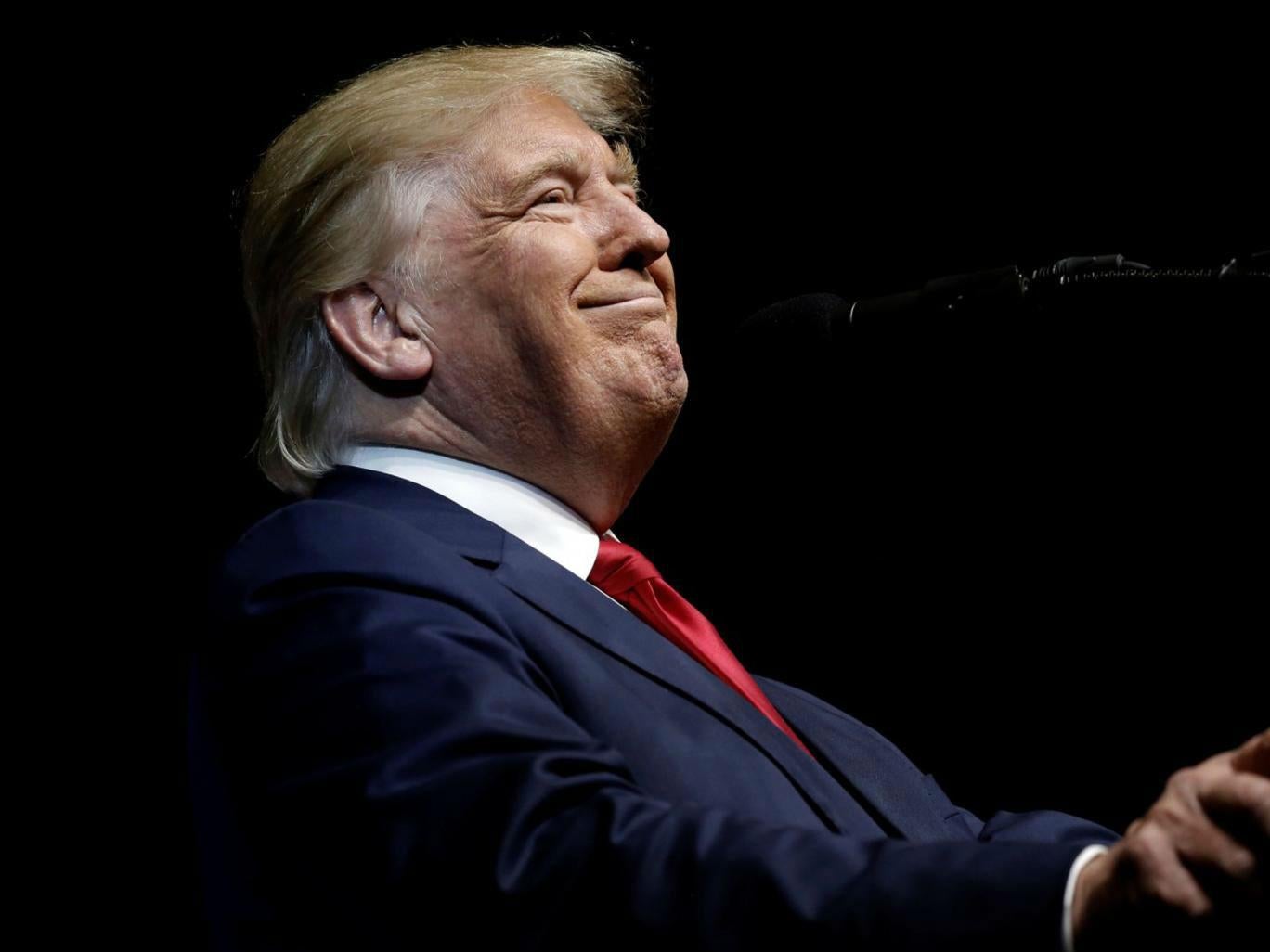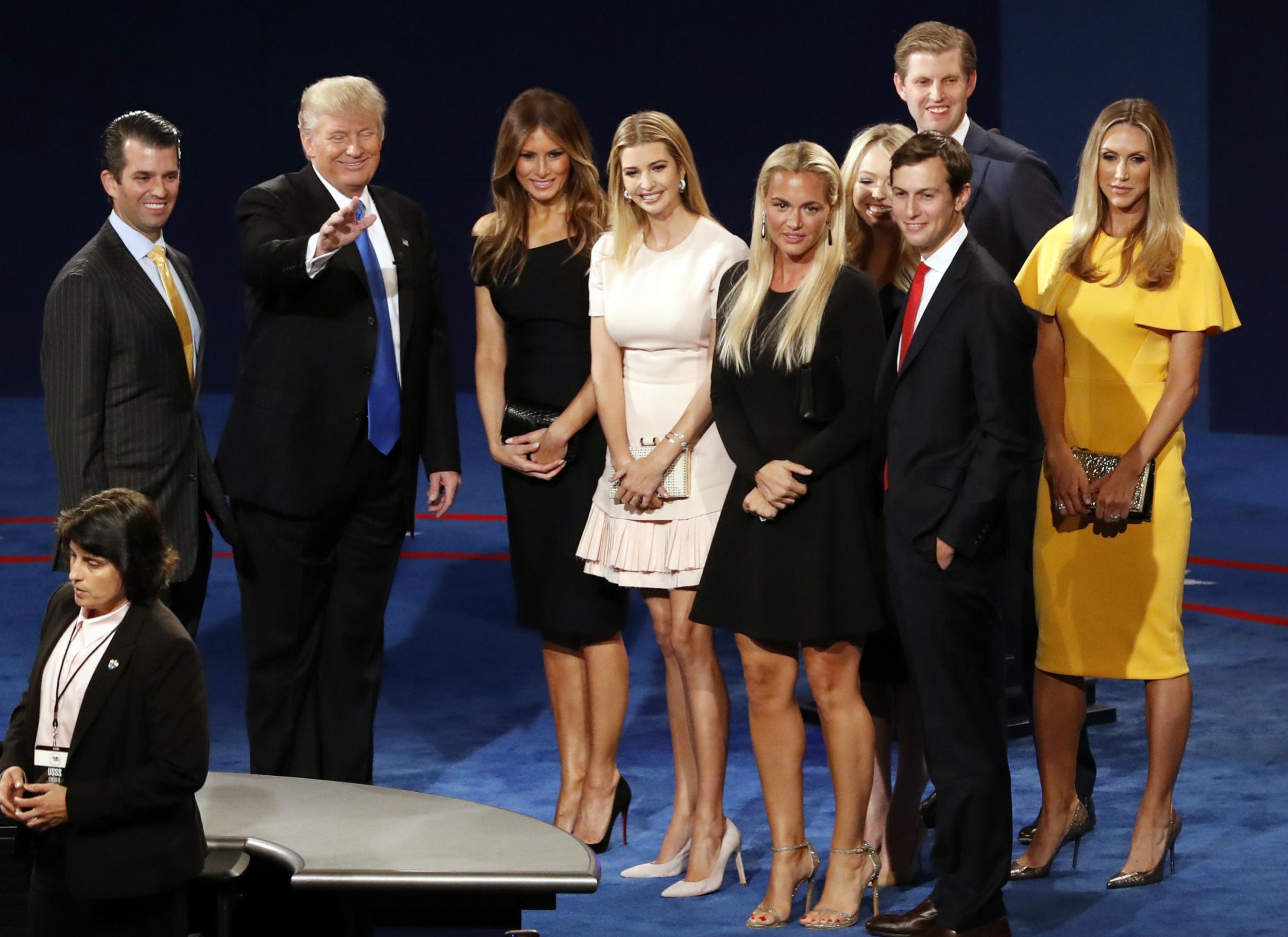Donald Trump? The unlikely President whose ignorance is only outstripped by his arrogance
Quite simply, we have never seen a candidate and President like him

Donald Trump is a President unlike any before him.
He has never held elective office. He’s not a military man, as were 12 US presidents, most recently Dwight Eisenhower. He’s not even from the top drawer of business.
Instead he’s a product of the television age, of his own colossal ego, and of the resentments of tens of millions of mostly white, less affluent Americans who feel the established political class has betrayed them. And in the process, he’s turned the rules of politics upside down.

The more people he insults, the more he seems to thrive. In the eyes of his followers at least, he’s made political incorrectness a cardinal virtue. His ignorance is jaw-dropping, his disregard for the truth even more so. A normal politician smiles, but Trump glowers and blusters. He gets away with lies, blunders, bigotry, misogyny and racism that would have long since floored anyone else.
He won the nomination of the Republican party. Yet – to the extent that he has consistent policies – he flouts core Republican orthodoxies: most of the party’s social conservative tenets, its belief in free trade and open markets, and America’s role as bulwark of a Western alliance against rival powers like Russia, whose leader Trump openly admires. The thinness of his skin, his vindictiveness, his inability to sustain interest in anything beyond his grudges, has had some even wonder about his mental stability.

And yet, having swept aside one of the strongest ever Republican fields in the primaries, he then won the most powerful office on earth: one that in the view of much of America’s foreign policy, military and economic and business establishment, he is utterly unfit to hold. How did it come to this?
Donald Trump’s White House ambitions did not materialise out of thin air on the morning of 16 June, 2015, when he dsecended into the main lobby of Trump Tower in Manhattan to announce his candidacy. For the best part of 30 years he has felt the political itch, even though party affiliation has never greatly mattered.
Since he first mused aloud about a White House run in 1988, he has variously been a Republican, an independent, a supporter of the Reform Party and, between 2001 and 2008 a Democrat. Only when Barack Obama (against whom he led a shameful five-year-long campaign to prove the 44th president was not a US citizen) took office did he again become a Republican.
There have been enduring Trump themes over the years, notably his belief that America should no longer be policeman of an ungrateful world, and that countries like China, and even most of its allies were simply ripping it off. The rest though has been mostly improvisation. The biggest constant of all has been personal: his own conceit and unwavering belief in his own talents, especially his business acumen – that he is never wrong, that he is a winner in a world of abject losers.
Even in business however, the record has been patchy. He boasts of a net worth of $10bn: Forbes magazine and others who try to pull together an estimate of his fortune put the figure around $4bn at most. And today’s glitzy Trump-world, of skyscrapers, top-of-the-line hotels and golf resorts, and a personal brand hawking gaudy wealth, conceals an often troubled past.
Son and grandson of New York real estate developers, Donald went into the family business early, helped by a loan from his father Fred Trump. There were quick successes but in the late 80s and early 90s a series of setbacks almost destroyed him – casino bankruptcies, the ill-judged purchases of Eastern Airlines Shuttle and the New York Plaza Hotel.
Their legacy, almost certainly, was the $916m loss Trump claimed in the pages of his 1995 tax returns leaked to The New York Times last month (after his steadfast refusal to make those returns public, in contrast with every presidential candidate in over 40 years, starting with Richard Nixon.)

This gigantic carried loss may have enabled Trump to pay no federal income tax for 18 years. “Which makes me smart,” he interjected in the first presidential debate with Hillary Clinton. The question though inevitably arises: are the 99 per cent of ordinary American taxpayers who can’t exploit property industry loopholes mere fools? It also fits a pattern. When a Trump venture fails, investors and contractors may take massive hits, but the man himself sails on.
Rating his business prowess is helped neither by his own addiction to hyperbole nor by the fact that his umbrella company, the Trump Organisation, is privately owned and thus publishes few figures. His career has been a mixture: of failures like those noted above and unsavoury ventures like the Trump Foundation, a charity of dubious purpose that is not even certified to operate in New York, and the Trump University, little more than a scam – but featuring indubitable successes as well. Trump’s skills as self-promoter and salesman have never been in doubt.
Then there has been Trump the TV personality. He made a fortune out of The Apprentice; even more important for his foray into politics, it gave him an understanding of television and its powers, unmatched by any candidate before or since. Put it all together and Trump perfectly illustrates that truism of running for the American presidency. Be it the result of canny judgement or dumb luck, you’ve got to be the right person in the right place at the right time.
His timing has been perfect. In America, politics and show business have become one. Politics become entertainers and entertainers politicians. Reality TV, at which Trump excels, has subverted the meaning of reality, creating a world in which everyone could choose his own, in which Trump’s lies, exaggerations and distortions are, for his supporters, a reality as good or better than any other.
Meawhile the intellectual decay of the Republican party has provided the opening. A party primarily at the service of wealthy corporate America has peddled a social conservatism that has persuaded swathes of poorer Americans to vote against their economic interests, which the party never seriously sought to advance. The stage was set for a populist to take over the party. He might be despised by the Republican establishment, and loathed by true conservatives, but he could galvanise the masses. Thus Trump’s march through the primaries, bringing to the polls many who had never voted before.
Helping him mightily has been public disgust at Washington and all its works, at a self-perpetuating and out-of-touch elite which led the country into failed wars, and an economic and financial crash whose effects still reverberate eight years later.
All has contributed to a pervasive sense of national decline, both in America’s military and diplomatic clout in the world, and in its economy at home.
Official figures may say the US is enjoying its longest economic upswing in decades. For many Americans it doesn’t feel like it. For them, only a genuine outsider can cleanse these Augean stables and bring the change they crave. Step forward Donald Trump.
Finally, he has been lucky in his opponent. Hillary Clinton, a fixture in national politics for a quarter of a century, owns a massively imposing resume. Her qualifications for the job are indisputable.
But that same resume makes her the embodiment of the establishment and the most implausible reformer. How can someone who is a close ally of the incumbent president, who seeks to extend Democratic control of the White House a further four or eight years, conceivably be an agent of change?
And not only that. Apart from Trump himself, no candidate in memory has been as distrusted and disliked by voters as Clinton. Among Republicans who have spent 25 years seeking to destroy her and her husband, she inspires a quite irrational hatred. Trump’s excesses may be forgiven as a lesser evil, if the alternative is a Clinton restoration.
Certainly now, the forces he has unleashed will not go away. Yes, the circumstances of 2016 were perfect for a Republican outsider. But how did a man as unsuitable for the presidency manage to win?
Join our commenting forum
Join thought-provoking conversations, follow other Independent readers and see their replies
Comments
Bookmark popover
Removed from bookmarks